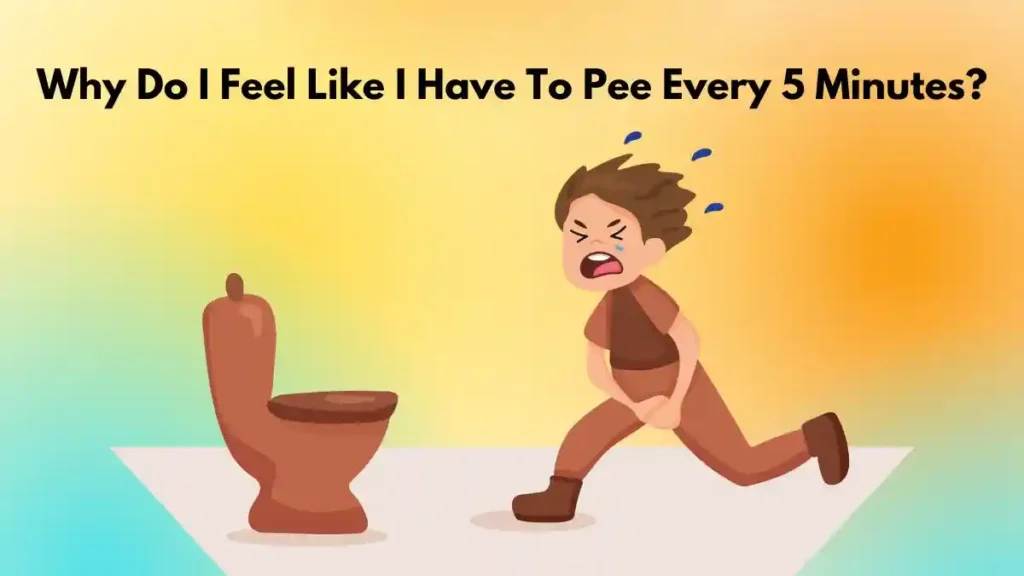Frequent urination can be both frustrating and concerning. If you’re wondering, “Why do I feel like I have to pee every 5 minutes?” you’re not alone. This article will delve into the possible causes, symptoms, and when you should seek medical advice.
Table of Contents
Common Causes of Frequent Urination
Frequent urination can stem from various factors, including lifestyle choices, medical conditions, and anatomical changes. Below is a table summarizing some of the most common causes:
| Cause | Description |
|---|---|
| Urinary Tract Infection (UTI) | Bacterial infections in the urinary system can lead to increased urgency and frequency of urination. Symptoms often include burning sensations. |
| Overactive Bladder (OAB) | A condition where the bladder muscles contract involuntarily, causing a frequent and urgent need to urinate, often without a full bladder. |
| Diabetes | High blood sugar levels can lead to increased urine production, resulting in more frequent urination. |
| Pregnancy | The growing uterus can exert pressure on the bladder, leading to increased urinary frequency, particularly in the first and third trimesters. |
| Enlarged Prostate (BPH) | In men, an enlarged prostate can press against the urethra, obstructing urine flow and causing frequent urges to urinate. |
| Bladder Irritants | Consuming substances like caffeine, alcohol, and acidic foods can irritate the bladder, increasing the need to urinate. |
| Interstitial Cystitis (IC) | A chronic condition causing bladder pressure and pain, often accompanied by frequent urination and discomfort. |
Symptoms Associated with Frequent Urination
Frequent urination is often accompanied by other symptoms that can help identify the underlying cause. Here are some symptoms to watch out for:
| Symptom | Possible Cause |
|---|---|
| Burning sensation during urination | Urinary Tract Infection (UTI) |
| Sudden, strong urge to urinate | Overactive Bladder (OAB) |
| Increased thirst and hunger | Diabetes |
| Pelvic discomfort | Pregnancy or UTI |
| Nighttime urination (Nocturia) | Diabetes, Overactive Bladder |
Urinary Tract Infection (UTI):
A common cause of frequent urination is a urinary tract infection. UTIs can affect any part of the urinary system, including the kidneys, bladder, and urethra. When bacteria invade the urinary tract, they can cause inflammation and irritation, which often results in a frequent urge to urinate. Other symptoms may include a burning sensation while urinating, cloudy or strong-smelling urine, and pelvic pain. UTIs are more common in women but can affect men as well. Treatment typically involves antibiotics prescribed by a healthcare provider.
Overactive Bladder (OAB):
Overactive bladder is a condition characterized by a sudden, uncontrollable urge to urinate frequently, which can lead to involuntary leakage. This condition may be caused by involuntary contractions of the bladder muscles, leading to an urgent need to urinate, often accompanied by frequency and sometimes nocturia (waking up at night to urinate). Managing OAB might involve lifestyle changes, pelvic floor exercises, and medications like anticholinergics or beta-3 agonists.
Diabetes:
Diabetes, both type 1 and type 2, can lead to frequent urination. High blood sugar levels force the kidneys to work harder to filter and absorb the excess glucose. When the kidneys can’t keep up, the excess glucose ends up in the urine, pulling more water along with it and causing frequent urination. This can also lead to dehydration and increased thirst. Managing diabetes through diet, exercise, and medication is crucial for controlling symptoms.
Diuretic Medications:
Diuretics, often referred to as “water pills,” are commonly prescribed to treat high blood pressure and fluid retention. These medications work by increasing urine production to help remove excess sodium and water from the body. While effective for their intended purposes, they can also lead to frequent urination. If you are on diuretics, it’s important to follow your doctor’s guidance on how to manage this side effect.
Bladder Irritants:
Certain foods and beverages can irritate the bladder and lead to increased urination. Common irritants include caffeine, alcohol, spicy foods, and acidic foods. Reducing or eliminating these from your diet might help decrease the frequency of urination.
Interstitial Cystitis (IC):
Interstitial cystitis is a chronic condition characterized by bladder pain and frequent urination. It is often accompanied by discomfort in the pelvic region and a frequent need to urinate, even when the bladder isn’t full. The exact cause of IC is unknown, but treatment may include dietary changes, medications, and bladder installations.
Pregnancy:
During pregnancy, the growing uterus can put pressure on the bladder, leading to increased frequency of urination. Additionally, hormonal changes during pregnancy can affect the bladder and urinary tract. While this is a normal part of pregnancy, it’s important to stay hydrated and discuss any concerns with your healthcare provider.
Prostate Issues:
In men, an enlarged prostate (benign prostatic hyperplasia) can press against the urethra and bladder, leading to frequent urination. Prostate infections or prostatitis can also cause similar symptoms. Treatment for prostate-related issues may include medications, lifestyle changes, or surgical options depending on the severity.
Stress and Anxiety:
Emotional and psychological factors, such as stress and anxiety, can affect bladder function. Stress can lead to increased frequency of urination or even urge incontinence. Learning stress management techniques and addressing anxiety through therapy or counseling might help alleviate these symptoms.
Fluid Intake:
High fluid intake, especially close to bedtime, can lead to frequent urination. Be mindful of your fluid consumption and try to spread it throughout the day. Reducing fluid intake in the evening can help prevent nighttime urination.
Neurological Conditions:
Certain neurological conditions, such as multiple sclerosis (MS) or stroke, can impact the nerves that control bladder function. This can result in symptoms like frequent urination, urgency, or incontinence. Managing the underlying neurological condition is essential in addressing bladder symptoms.
Other Medical Conditions:
Several other medical conditions can affect urinary frequency, including kidney disease, heart failure, and certain cancers. Each condition may require specific treatments and management strategies.
Managing Frequent Urination:
- Hydration and Diet: Balance your fluid intake and avoid irritants. Drinking plenty of water is essential, but try to avoid excessive caffeine and alcohol.
- Bladder Training: Techniques such as scheduled bathroom breaks and gradually increasing the time between urinations can help manage frequent urges.
- Medication: Depending on the cause, your healthcare provider might prescribe medications to manage symptoms or address the underlying condition.
- Pelvic Floor Exercises: Strengthening the pelvic floor muscles through exercises like Kegels can help with bladder control.
- Medical Consultation: It’s important to consult with a healthcare professional if you experience frequent urination, especially if it’s persistent or accompanied by other symptoms. They can conduct appropriate tests, diagnose the condition, and recommend a treatment plan.
Frequent urination can have multiple underlying causes, and understanding these can help in seeking the right treatment. If you’re concerned about your symptoms, a healthcare provider can offer personalized guidance and support.
FAQs
Is frequent urination a sign of a medical condition?
Yes, it can indicate conditions like a urinary tract infection (UTI), diabetes, or an overactive bladder.
Can dehydration cause frequent urination?
No, dehydration usually causes reduced urination; frequent urination is more often linked to increased fluid intake or other conditions.
Does anxiety cause frequent urination?
Yes, anxiety can trigger the body’s “fight or flight” response, leading to increased urination.
Should I see a doctor if I need to pee every 5 minutes?
Yes, persistent urination should be evaluated by a healthcare professional to rule out underlying issues.
Discover more from Majhi Naukri | माझी नोकरी 2025
Subscribe to get the latest posts sent to your email.



